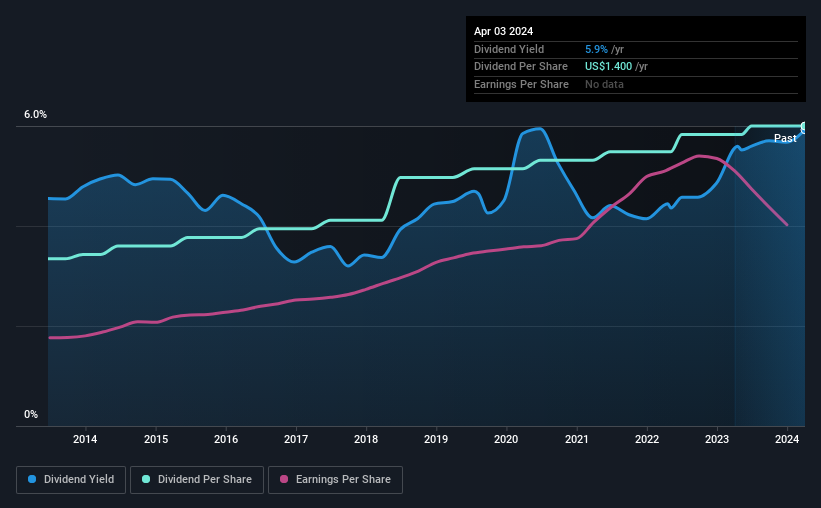The First Bancorp, Inc. (NASDAQ:FNLC) Is About To Go Ex-Dividend, And It Pays A 5.9% Yield
Regular readers will know that we love our dividends at Simply Wall St, which is why it's exciting to see The First Bancorp, Inc. (NASDAQ:FNLC) is about to trade ex-dividend in the next three days. The ex-dividend date is one business day before the record date, which is the cut-off date for shareholders to be present on the company's books to be eligible for a dividend payment. The ex-dividend date is important because any transaction on a stock needs to have been settled before the record date in order to be eligible for a dividend. Meaning, you will need to purchase First Bancorp's shares before the 8th of April to receive the dividend, which will be paid on the 19th of April.
The company's upcoming dividend is US$0.35 a share, following on from the last 12 months, when the company distributed a total of US$1.40 per share to shareholders. Looking at the last 12 months of distributions, First Bancorp has a trailing yield of approximately 5.9% on its current stock price of US$23.63. Dividends are a major contributor to investment returns for long term holders, but only if the dividend continues to be paid. So we need to check whether the dividend payments are covered, and if earnings are growing.
See our latest analysis for First Bancorp
Dividends are typically paid from company earnings. If a company pays more in dividends than it earned in profit, then the dividend could be unsustainable. First Bancorp paid out 52% of its earnings to investors last year, a normal payout level for most businesses.
Generally speaking, the lower a company's payout ratios, the more resilient its dividend usually is.
Click here to see how much of its profit First Bancorp paid out over the last 12 months.
Have Earnings And Dividends Been Growing?
Companies with consistently growing earnings per share generally make the best dividend stocks, as they usually find it easier to grow dividends per share. If earnings decline and the company is forced to cut its dividend, investors could watch the value of their investment go up in smoke. With that in mind, we're encouraged by the steady growth at First Bancorp, with earnings per share up 4.0% on average over the last five years.
The main way most investors will assess a company's dividend prospects is by checking the historical rate of dividend growth. In the last 10 years, First Bancorp has lifted its dividend by approximately 6.0% a year on average. We're glad to see dividends rising alongside earnings over a number of years, which may be a sign the company intends to share the growth with shareholders.
To Sum It Up
From a dividend perspective, should investors buy or avoid First Bancorp? Earnings per share have been growing at a reasonable rate, and the company is paying out a bit over half its earnings as dividends. It might be worth researching if the company is reinvesting in growth projects that could grow earnings and dividends in the future, but for now we're on the fence about its dividend prospects.
Keen to explore more data on First Bancorp's financial performance? Check out our visualisation of its historical revenue and earnings growth.
Generally, we wouldn't recommend just buying the first dividend stock you see. Here's a curated list of interesting stocks that are strong dividend payers.
Have feedback on this article? Concerned about the content? Get in touch with us directly. Alternatively, email editorial-team (at) simplywallst.com.
This article by Simply Wall St is general in nature. We provide commentary based on historical data and analyst forecasts only using an unbiased methodology and our articles are not intended to be financial advice. It does not constitute a recommendation to buy or sell any stock, and does not take account of your objectives, or your financial situation. We aim to bring you long-term focused analysis driven by fundamental data. Note that our analysis may not factor in the latest price-sensitive company announcements or qualitative material. Simply Wall St has no position in any stocks mentioned.

 Yahoo Finance
Yahoo Finance 
